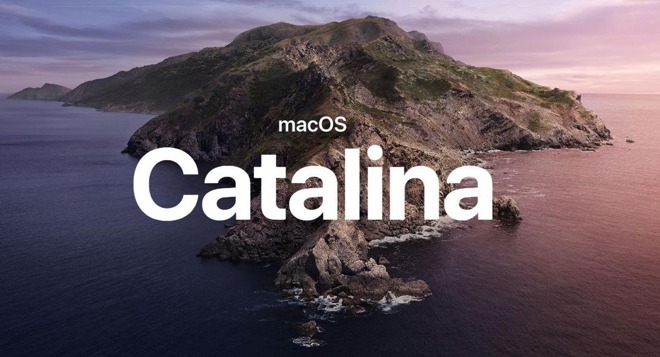Apple releases Catalina 10.15 GM seed to developers for testing
Apple has released what is likely the release candidate of macOS Catalina to beta testers, in a final push to eradicate launch bugs.

The latest macOS Catalina beta released less than a week after the tenth beta appears focused on bug eradication. There are no new features highlighted or obvious versus beta 10.
The release of macOS Catalina isn't scheduled any more specifically than October. Apple's regional website in Denmark suggested that the operating system would be released on October 4.
If accurate, the October 4 release date would be contrary to most Apple OS releases. As a general rule, Apple rolls out full releases of software on Tuesdays or Wednesdays.
Announced in June, macOS Catalina incorporates new technologies like Voice Control, second-screen capabilities with a connected iPad through Sidecar, and a refreshed user interface. Other major additions include Project Catalyst, a development framework that enables app makers to more easily port iOS software to Mac, and a breakup of iTunes.

The latest macOS Catalina beta released less than a week after the tenth beta appears focused on bug eradication. There are no new features highlighted or obvious versus beta 10.
The release of macOS Catalina isn't scheduled any more specifically than October. Apple's regional website in Denmark suggested that the operating system would be released on October 4.
If accurate, the October 4 release date would be contrary to most Apple OS releases. As a general rule, Apple rolls out full releases of software on Tuesdays or Wednesdays.
Announced in June, macOS Catalina incorporates new technologies like Voice Control, second-screen capabilities with a connected iPad through Sidecar, and a refreshed user interface. Other major additions include Project Catalyst, a development framework that enables app makers to more easily port iOS software to Mac, and a breakup of iTunes.

Comments
It will be interesting to see how this plays out -- will Apple be forced to walk back the decision to kill off 32 bit apps? Probably not, but I bet uptake on Catalina will be much slower than past operating systems.
10.4 & 10.6 come to mind as precedents spanning multiple years:
https://en.wikipedia.org/wiki/MacOS_version_history#Timeline
Did Steve Jobs end MacWorld for similar reasons ie. the annual deadline presssure it put on Apple?
Has such a burden been transferred more on new hardware customers ?
Should buyers get new macs soon if wanting the fullest support on the current not-just-out-of-beta macOS...?
FWIW, developers have been able to compile 64-bit for over a decade. I know it's not as simple as a checkbox in many cases, but still.
I'm more concerned about Gatekeeper and apps like MakeMKV.
Either you upgrade within 1 year or so, or you're left with an unsupported system that doesn't play as well with the rest of the ecosystem (iPhone, airpods, watch, iPad, etc) and doesn't take advantage of their new features. You can of course still rock a 10.5 today, if you want to, but you're on your own, almost as if you were running an Apple II or Amiga 500 today.
I'm more concerned about the perceived quality of Catalina 10.15 as it currently stands. For the same reason, I have not upgraded my eligible iDevices to iOS 13. Both operating systems sound buggy as hell right now and Apple couldn't pay me to make them my default boot OSes at this time.
While eventually I will upgrade to both operating systems, it might be Q1 2020 before I do so. If anything, I might try to find a spare drive and install Catalina on that before I install it on the built-in SSDs.
This is the first year in a decade that I haven't installed the new OS within a day or two of release.
I guess it would be something to try before you start installing any apps, migrating data, etc. If it doesn't work, just boot to internet restore and let macOS Catalina reinstall.
I worked on an app which supported loading 3D content in a bunch of different formats. A couple of the components we used to load that content were very old and only available as 32-bit (no longer supported). So if we wanted to move to 64-bit we either had to drop support for those formats (which would make customers unhappy), find 64-bit replacements (no good options existed), or write our own (very costly -- couldn't be justified to management to spend that much on it).
In the past, moving forward has had advantages to customers. For example, an x86 native app will be faster than an emulated PPC app. If Aspyr were to make Homeworld Remastered 64 bit instead of 32 bit, what would that get me? I strongly suspect the answer is: NOTHING.
I feel you about the hesitation. If the company that makes your 32-bit apps don't/will-no support the migration to 64-bit only given literally years to be ready, then that says a lot about their support. Guess it's more important to just go out of business then.
https://tidbits.com/2019/09/18/moving-to-catalina-keep-your-32-bit-mac-apps-running-with-parallels/